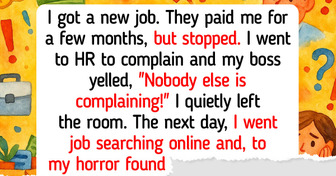NTA, listen at this point, if possible, call your DIL and make a date, just the two of you to air out your differences. Try to talk things through as adults so that going forward you'll both have an understanding of what each of you expects. Your DIL is entitled to her opinion about you but in no way should she be dispectful to you. Respect goes both ways. Maybe in time things will smooth out but the key here is to TRY. Hopefully you'll both be in a better space and you get to spend time with your grandchild. I truly hope this helps.
I Didn’t Invite My DIL on Our Family Trip — And I’m Not Sure I Regret It

Family vacations are meant to build happy memories, but this time around, things didn’t go as planned. I chose not to include my daughter-in-law in our annual trip, and it shocked the whole family. It was a tough call, but at the moment, it seemed like the right thing to do.
Shelley shared a deeply emotional experience from her life.
Hello, Bright Side! I’m Shelley. I wanted to open up about something that’s been on my mind lately. What’s done is done, but I keep thinking—did I do the right thing, or did I cross a line? I’d really appreciate hearing what others think about it.
My daughter-in-law, Megan, never seemed to like me. She and my son Ryan have been married for three years now. I’ll be honest—I didn’t support their marriage at first, but I eventually accepted it because Ryan’s happiness matters most. They have a little girl who means the world to me, and I’ve been genuinely trying to build a better bond with my DIL, but it’s been a challenge.
She’s been making these snide comments lately, and I can’t help but feel they’re meant to put me down. At family gatherings, she brushes off my thoughts like they’re outdated, and rolls her eyes if I offer suggestions. But what really got to me happened during Ryan’s birthday dinner.
Each summer, we plan a getaway, and this time I picked a family trip to the beach. Everyone seemed happy about it. Megan said, “Lovely idea,” and gave me a hug. I was cautiously hopeful.
But that night, while we were setting the table, she whispered to me, “You just plan everything because you can’t let anyone else do it.” Everyone went quiet. Later on, in the kitchen, she told me, “I didn’t mean to offend you... it’s just that you like being in control.” She said it gently, but it still felt like a dig. That’s when I decided—I couldn’t go on a trip like that, spending days with someone who doesn’t treat me with respect.

Sounds like Grandma was a beach first while her son was dating and first married to his wife. I bet she did overbearing "Grandma rights" when her grandchild was born. Grandma needs to let her son have his own family.
The day after the dinner, I sat down with Ryan and told him I thought it would be better if Megan didn’t come on the family trip. I said I just needed some space and a break from all the tension. He didn’t take it well—he said he didn’t want to be caught in the middle and warned me that Megan wouldn’t be happy about it. He was right.
Later that day, she called me, clearly furious. She accused me of being too controlling and even said I was tearing the family apart. I was shocked—I really didn’t expect that level of anger.
Even so, we went ahead with the trip, and to be honest, it was calm and enjoyable. We laughed more, had meaningful conversations, and the whole atmosphere felt lighter. But ever since we got back, Megan hasn’t reached out. She won’t visit, and worst of all, I haven’t seen my granddaughter. That part really hurts.
Now I’m left wondering—should I reach out and say sorry? I’m torn and not sure how to fix things without losing even more.

Megan told you to your face what everyone is whispering behind your back. Now look at you. And your son was weak for going without his wife. If my husband isn't welcome then neither am I. The only exception of course is when your spouse actually IS a horrible person. You disapproved of the marriage? Yeah, probably wanted to choose his wife for him. You need therapy.
Hi Shelley, thanks for opening up and telling us what you’ve been going through. Disagreements within a family can be emotionally exhausting for everyone involved. Here are a few steps you can take to help move forward and hopefully ease the tension:
Look at your part in what happened: Think back on how things unfolded and try to see how Megan might’ve felt. Even if you believed your choice was fair, understanding how it looked from her side could help you figure out what to do next.
Say sorry if it feels right: If you come to realize that leaving her out of the trip caused pain, offering an apology might be the first step to repairing the relationship. It doesn’t mean you’re fully to blame—it just shows you care about keeping peace in the family.
Be honest but kind about your limits: While it’s important to reconnect, don’t forget to stand up for yourself gently. If her tone or words have hurt you, let her know calmly and offer ideas on how you can both avoid miscommunication moving forward.
Talk to your son again: Ryan is in the middle, and that’s never easy. If you feel like the air still needs clearing, you might approach him again. Let him know that you understand it put him in a hard spot, and you’re not proud of how things fell apart. Make it clear that your intention is not to divide the family, but to find a healthier way to connect.
Set clear boundaries: Try setting boundaries that allow space for both connection and protection. For example, you might say, “I’m happy to plan family activities, but I’d love to share that responsibility if others are interested too.” This removes the power struggle and invites Megan to feel included.
Reopen the door, but don’t force it: Reaching out doesn’t mean begging for forgiveness. It means saying: “I care about our family. I want peace. I’m open to reconnecting when you’re ready.” Relationships sometimes grow slower than we hope. But love, patience, and consistency have a powerful way of healing what feels broken.
In a different message we received, a woman explained why she chose not to help her mom financially after she retired. You can read what led her to make that decision here.
Comments
Yta bigtime, get over yourself.
Not sure how this can heal. I agree she sounds difficult but your decision to omit her really was over the top.
What kind of husband goes on that “family” trip without his wife? Mom is 100% and AH, but her son is fighting her for the title.
Related Reads
10 Plot Twists That Prove Life Can Get More Shocking Than Movies

12 Real-Life Chilling Stories That Can Haunt Your Dreams

My DIL Severely Offended Me, She Regretted It When I Opened Up About Who I Really Am

My Boss Stopped Paying Me—So I Took Matters Into My Own Hands

I Refuse to Adopt My Dying SIL’s Baby—Her Last Words Left Me Frozen

I Refused to Stay After My Husband Secretly Spoiled His Daughter—Then I Heard the Truth

I Refuse to Return to the Office After My Coworker’s ‘Prank’ Revealed His Darkest Secret

I Refuse to Keep Working for Half What My Boss Earns

My Family Ignored Me My Whole Life—Now Suddenly They Want My Help

I Refused to Follow My Mom’s “Different Beds” Rule—And the Real Reason Was Heartbreaking

15 Stories That Prove a Small Spark of Kindness Can Light Up a Fading Soul

14 Powerful Kindness Stories That Restored Hope in Tough Times


